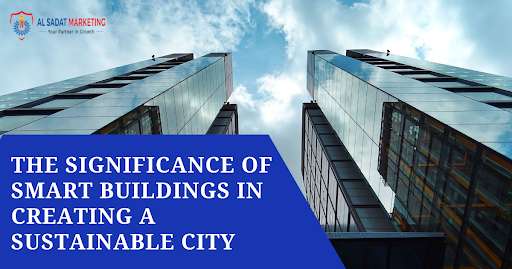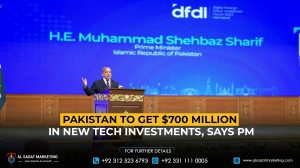Significance of Smart Buildings in Creating A Sustainable City
Al Sadat Marketing have accomplished so many achievements whether it is upto own teams goal or it is upto achieving excellency in housing development projects. Al Sadat Marketing have received so many awards from the society owners. Browse our gallery page below for more information.

This year has been a defining moment in the fight against climate change. Many governments throughout the world are establishing carbon reduction objectives and developing ecologically friendly areas for their citizens.
In Pakistan, on the other hand, urbanization is increasing and cities are becoming increasingly crowded. We must also develop and implement strategies to reduce emissions in towns, cities, and the country as a whole, as well as save energy and accelerate our transition to renewable energy.
With cities and buildings accounting for 65 percent of global energy consumption, smart city growth is regarded as a vital strategy for addressing climate catastrophe. To generate inclusive and sustainable solutions, a modern city requires smart data, people, and technology.
As a result, smart buildings are rapidly taking the lead in the evolution of smart cities. They are widely acknowledged as vital tools for tackling the numerous difficulties we face today and in the future, including achieving net-zero goals, guaranteeing security, and fulfilling the desire for more interoperability.
Smart buildings are sweeping the industry as new and improved technology emerges, utilising the Internet of Things (IoT) to exchange data, regulate operations, and increase human contact. While these advances are thrilling, they also hold great potential for long-term sustainability.
As a result, today’s buildings are critical for the evolution of smart cities – truly sustainable cities with cleaner transportation, optimised resources such as water and energy, and more intelligent buildings and infrastructures that serve essential human needs such as security, comfort, and connectivity. Finally, by building smart structures, we increase the liveability, workability, and sustainability of our cities.
Buildings and houses may use smart building technologies to utilise energy more efficiently. Because buildings are complex systems including air, water, and electricity, smart sensors and Internet of Things-based solutions can ensure that these resources are provided safely and effectively. However, it is not only about deploying new technology; smart thinking and the optimization of existing structures are equally critical in driving the global growth of smart cities.
Energy Consumption
Smart buildings are an important part of a future in which cities are secure, smart, and sustainable, and building owners can record and regulate their energy use. Buildings, as we all know, consume a lot of energy to keep functioning. Unfortunately, the more energy consumed, the greater the environmental impact. Almost often, more resources are offered than are required. Not only is this inefficient, but it is also immoral.
Fortunately, smart buildings provide a viable solution to growing energy demands.
Smart buildings are outfitted with cutting-edge technology that allows for simpler tracking of energy consumption.
These intelligent gadgets do not require human involvement and can function on their own. Human mistake, on the other hand, consumes no energy resources. As a result, smart buildings enable energy conservation and enhanced efficiency.
Detection of Errors
Smart buildings detect malfunctions instantly, making it easier to deal with them. Today’s battery management systems are quite effective at recognising risks. Furthermore, these systems require less human involvement.
Defects in smart buildings are identified immediately. As a result, addressing concerns and returning to business as usual becomes easier. Battery management systems, in particular, are quite good at detecting and targeting threats. Furthermore, these systems discover problems on their own, requiring little human participation.
Data Collection
Data collection on products and services is simpler with IoT devices. Sensors may be found in a wide range of devices, from heating systems to ventilation systems. As a result, if you require machine information, you won’t have any issues.
If you decide that a component is overworked or underutilized, you can leverage existing implementations to change your procedures. With such revolutionary technology, the days of limited systems and inadequate solutions are passed.
Sustainability
Keeping an eye on IoT power utilisation brings us up to date on ongoing setbacks, problem areas, and practical solutions. With this knowledge, we can reduce our carbon footprint, promote sustainability, and encourage eco-friendly alternatives. An occupancy sensor can aid in lowering carbon dioxide levels in a room. When this sensor detects a reduction in movement, it sends a signal to the building management system, ordering it to switch off the heating, ventilation, and lighting systems.
Read More: Nestle to Invest Rs. 3 Billion in Pakistan This Year
When individuals return, these mechanisms go back to normal, guaranteeing a secure and comfortable workplace. This programme conserves both energy and money. As more organisations accept these changes, fewer emissions are created, more eco-conscious solutions are implemented, and more firms are developing well-oiled systems. Because of these benefits, smart buildings are gaining popularity.
Smart cities will be the norm in the future.
From the home and workplace to transportation and utilities, smart cities will begin to take shape. Smart buildings, together with improvements in IoT and AI, will create a new smart society environment that is increasingly interconnected and efficient.
Read More: ChatGPT Has Been Leaking Your Conversations
It will allow people to live comfortably while also protecting the environment for future generations. Intelligent smart buildings with characteristics that were unthinkable only a few decades ago are already a reality and will be important to the establishment of sustainable smart cities.
You can also invest in other famous and most in demand housing societies, such as , Blue World City, Rudn Enclave, 7 Wonders City Peshawar, Taj Residencia, Kingdom Valley, New Metro City Gujar Khan, Forest Town Rawalpindi, University Town Rawalpindi, ICHS Town, Park View City Islamabad, Multi Gardens B17 Islamabad and Nova City Islamabad.
Al Sadat Marketing please contact 0331 1110005 or visit https://alsadatmarketing.com/
Few more real estate housing schemes which are trending now a days in Islamabad by including: Faisal Town Phase 2, Prism Town Gujar Khan, New City Paradise, Eighteen Islamabad, 7 Wonders City Islamabad, Capital Smart City, Silver City Islamabad, The Life Residencia, Faisal Town Islamabad, Islamabad Golf City, Islamabad Model Town and Marble Arch Enclave.
Al Sadat Marketing is an emerging Real Estate Agency headquartered in Islamabad, Pakistan. With over 10+ Years of experience, Al Sadat Marketing is providing its services and dealing all trending housing societies projects in different cities of Pakistan. Islamabad Projects, Rawalpindi Projects, Gujar Khan Projects, Burhan Projects, and Peshawar Projects etc.
Book Your Plot Now: +92 331 111 0005









